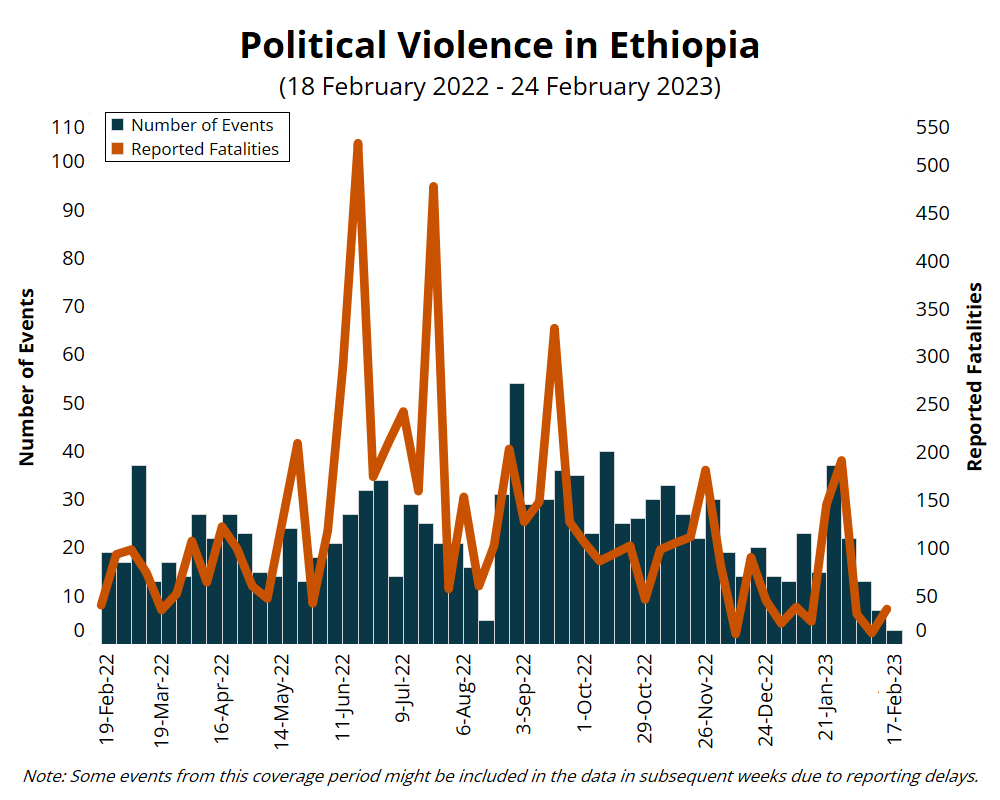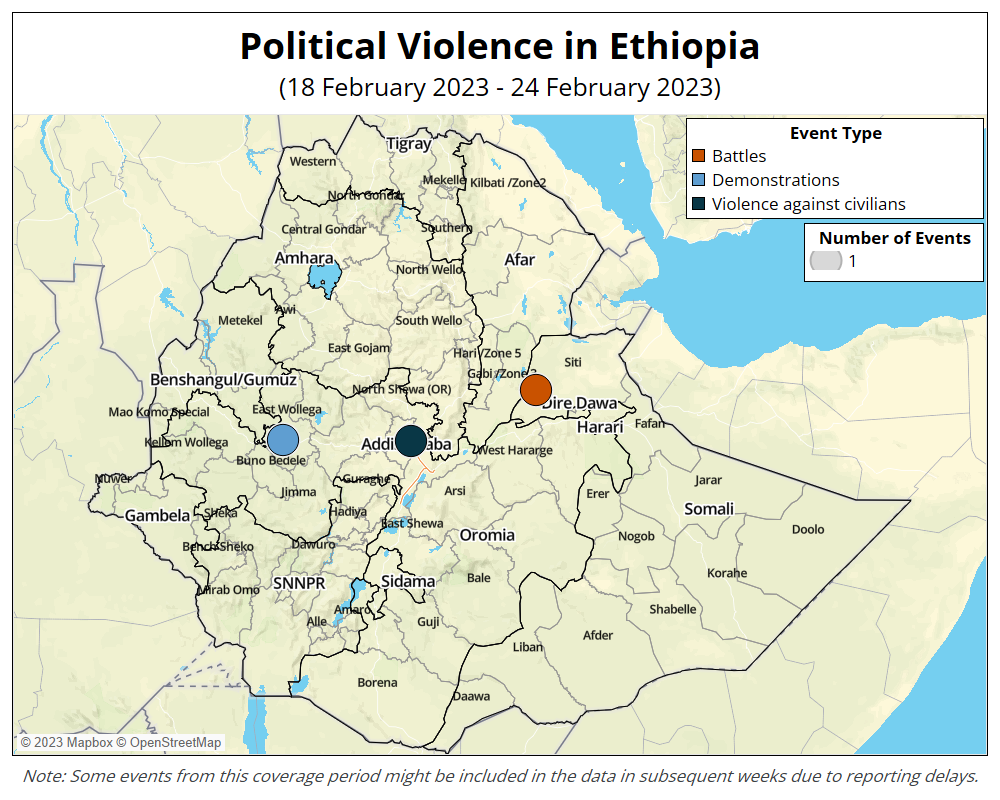By the Numbers: Ethiopia, 18 February 2022-24 February 2023
- Total number of political violence events: 1,216
- Total number of reported fatalities from political violence: 6,470
- Total number of reported fatalities from civilian targeting: 2,590
By the Numbers: Ethiopia, 18-24 February 20231 Some events from this coverage period might be included in the data in subsequent weeks due to reporting delays.
- Total number of political violence events: 3
- Total number of reported fatalities from political violence: 37
- Total number of reported fatalities from civilian targeting: 2
Ethiopia data are available through a curated EPO data file as well as the main ACLED export tool.

Situation Summary
Last week, the political situation in Ethiopia was relatively calm. ACLED records only four disorder events in the country last week, including two events in connection with the Ethiopian Islamic Affairs Supreme Council (Mejlis) – a riot event in Oromia region and a protest event in Amhara region. The other two recorded events included a violence against civilians event in Oromia and an armed clash event in Somali region (see map below).

On 19 February, a group of Muslim demonstrators entered the Fetih mosque in Nekemte town in East Wollega zone of Oromia region, blocking members of the newly appointed Mejlis from making a prayer speech. The group subsequently beat those in attendance at the mosque and smashed windows, resulting in a number of injuries. Forces from the command post stationed in the town intervened and managed to calm the situation. A week earlier, on 10 February, seven Muslim elders and religious teachers were arrested after they refused to hand over the biggest mosque in the town to the new Mejlis.2Addis Maleda, ‘What happened to the Muslims of Nekmete? Arrest of the youths who protested the demolition of houses in Sululta, the high representative of America in Addis Ababa!,’ 15 February 2023; This Mejlis is led by Haji Ibrahim Tufa – reportedly a Wahhabi – and was established on 18 July 2022 after years of dispute involving different sects of Muslims and the government; see Borkena, ‘Ethiopian Islamic Affairs Council elected new leaders,’ 18 July 2023
Sufi Muslims in Nekemte blame the new Mejlis for inciting violence, and claim it is “dominated by the Wahhabi sect.”3Addis Maleda, ‘What happened to the Muslims of Nekmete? Arrest of the youths who protested the demolition of houses in Sululta, the high representative of America in Addis Ababa!,’ 15 February 2023 Reportedly, similar disputes within the Muslim community exist in Addis Ababa, Harar, Ilu Aba Bora, Jimma, and Adama.4Addis Maleda, ‘What happened to the Muslims of Nekmete? Arrest of the youths who protested the demolition of houses in Sululta, the high representative of America in Addis Ababa!,’ 15 February 2023 On 19 February, Muslim residents of Kombolcha staged a protest in Kombolcha town in South Wello zone, Amhara region, and condemned the “illegal takeover of Mejlis by the Wahhabi sect.”5Addis Maleda, ‘It was said that an unknown number of people were injured due to a problem that occurred in a mosque of Nekmete city,’ 21 February 2023 The protesters chanted slogans such as “our leader is Haji Omer Idris,” “Islam is not for sale,” and “Mejlis belongs to Muslims, not to Wahhabis.”6Addis Maleda, ‘It was said that an unknown number of people were injured due to a problem that occurred in a mosque of Nekmete city,’ 21 February 2023
Although disputes in Oromia last week are unrelated to those occurring within the Ethiopian Orthodox Tewahedo Church, tensions in an array of religious institutions throughout the country mark a significant trend. As Ethiopia’s political space continues to evolve, additional disputes within Ethiopia’s public spaces are likely.
Further, demolition of houses continued in Oromia last week. On 21 February, residents objected to the demolition of their houses around Abeba Limat in Arba-arat Mazoreya in Legetafo – under the new arrangement, part of ‘Sheger city’ – while their homes were being demolished. Government security forces shot and killed two civilians and injured an unidentified number of others over a dispute in connection with the demolitions. Oromia’s new Sheger city was established in January 2023 by merging towns, districts, and some villages located within the Oromia special zone surrounding Addis Ababa.7Addis Standard, ‘News: Despite public protests over exclusion, admin hurdle, Shaggar City Council established, mayor sworn in,’ 9 January 2023 Since the establishment of the city, the Oromia regional government has been demolishing houses that are claimed to be ‘illegal.’
In Somali region, on 22 February, Afar ethnic militiamen clashed with Somali ethnic militiamen in Casbuli in Erer woreda, Siti zone. The clash resulted in around 35 reported militia fatalities and several injuries. The reason behind this clash is unknown. Armed clashes between these two actors usually occur over disputed areas located at the border of Somali and Afar regions (for more information, see EPO’s Afar-Somali Border Conflict page).
Lastly, the National Election Board of Ethiopia began releasing the outcomes of the referendum held in six zones – Gamo, Wolayita, Gofa, Gedeo, Konso, and South Omo zones – as well as in five special woredas – Burji, Amaro, Derashe, Basketo, and Ale – in Southern Nations, Nationalities and Peoples region (SNNPR). Referendum voting occurred on 6 February, and the results will decide whether a new regional state incorporating the above-named zones and special woredas will be established. Referendum results were delayed due to reported election discrepancies – like voter registration, unmatched number of voters and registered voters, etc. – in various polling stations in Wolayita zone.8 National Election Board of Ethiopia NEBE, ‘The National Election Board of Ethiopia passed decision regarding the electoral process in Wolayita zone,’ 20 February 2023 Preliminary outcomes indicate that a majority of voters support the establishment of a new regional state.9 National Election Board of Ethiopia NEBE, ‘Announcement of Referendum results conducted by the Ethiopian National Electoral Board in six zones (Gamo, Wolayita, Gofa, Gedeo, Konso, and South Omo zones) and in five special woredas (Burji, Amaro, Derashe, Basketo, and Ale) in SNNPR,’ 18 February 2023






